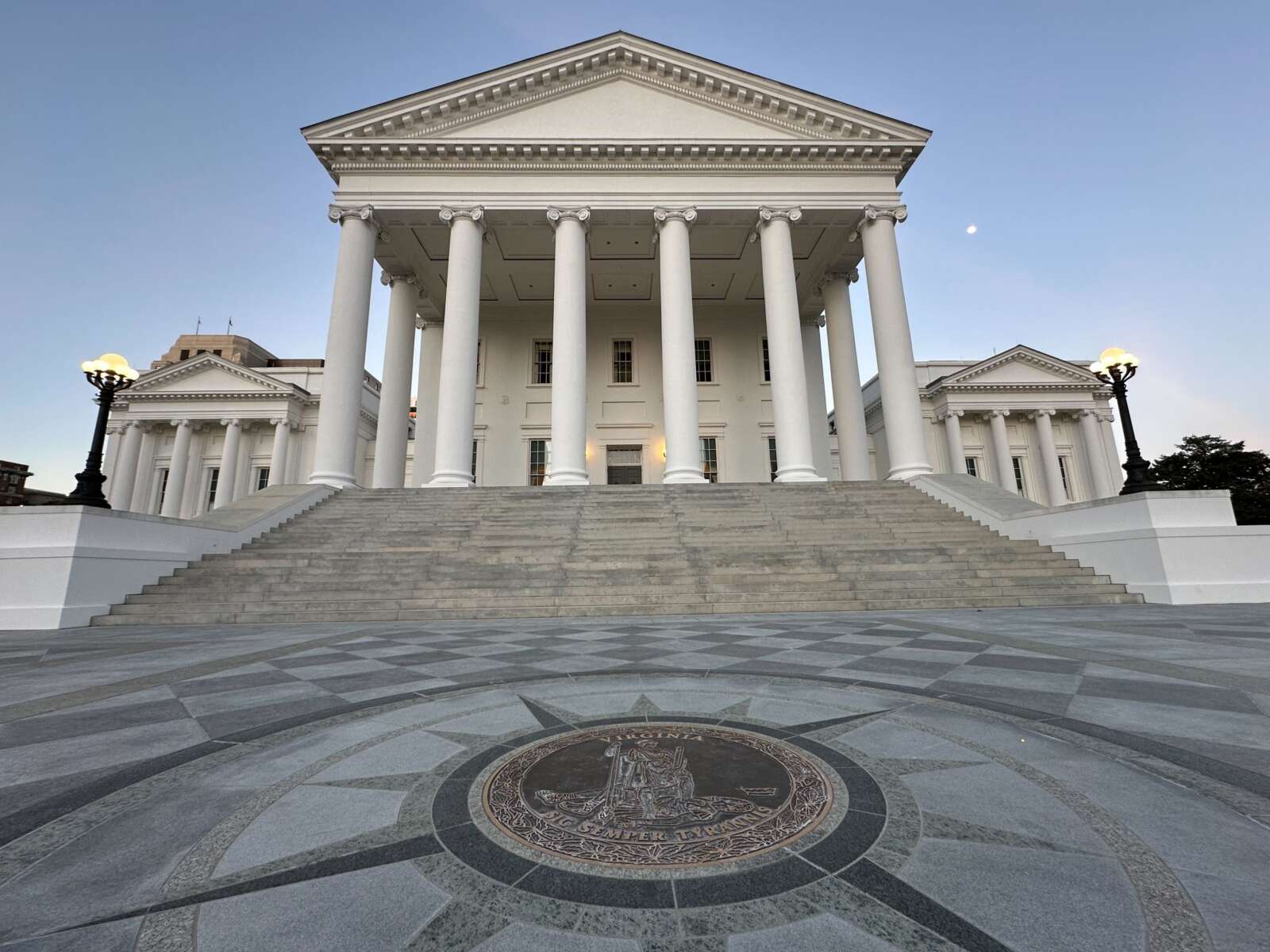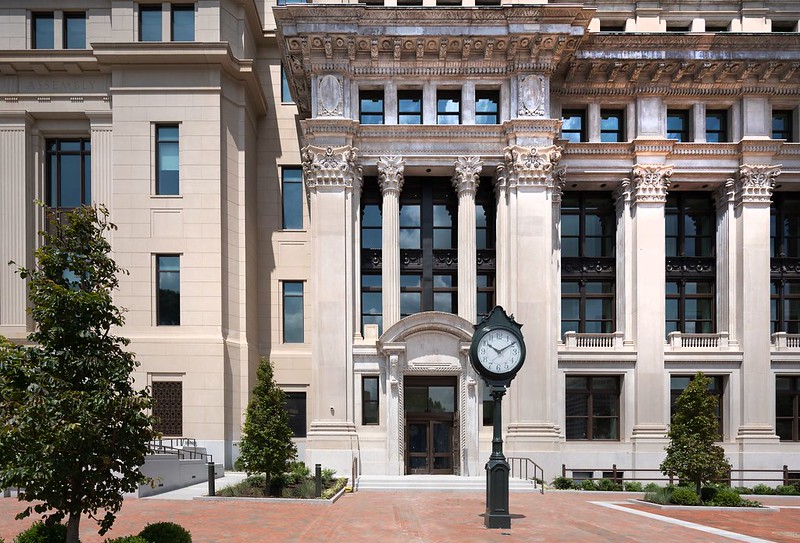
Hopes that Gov. Glenn Youngkin might sign a bill legalizing retail sales of marijuana in Virginia faded fast this week as Democrats blocked one of the governor’s top priorities: the plan to bring a professional sports arena to Northern Virginia.
As recently as Wednesday, according to multiple Capitol sources, the cannabis bill was being raised in closed-door budget talks with the governor as one of several Democratic priorities that could conceivably have been part of a package deal with the arena.
But the prospects of a grand policy bargain appeared to collapse Thursday as Democrats revealed a budget proposal without Youngkin’s arena plan, prompting the governor to say he was less inclined to look favorably on Democratic priorities. In a news conference (link added by FFXnow) on the Capitol steps, Youngkin said the arena deal Senate Democrats rejected involved up to 30,000 jobs and $12 billion in economic impact.
“And, bluntly, you want to talk about putting a cannabis shop on every corner?” Youngkin said. “I don’t quite get it.”
The governor said several other topics had been part of an “overall discussion” with Democrats. However, he suggested the rejection of an economic development project that could’ve drawn bipartisan support isn’t going to make him more likely to approve bills that passed mostly along party lines.
“I think this really sets us meaningfully back,” Youngkin said.
Del. Paul Krizek, D-Alexandria, a key sponsor of the marijuana proposal, said hopes for the bill were not high.
“As those great philosophers Tommy Chong and Cheech Marin would say, ‘It’s up in smoke,’” Krizek said.
Senate Majority Leader Scott Surovell, D-Fairfax, pointed to Youngkin’s comments on cannabis as evidence that it’s the governor who’s refusing to budge on issues that have popular support.
“He just basically flat out said one of our biggest priorities he’s not willing to consider,” Surovell said. “This governor wants to set the terms of every single negotiation as if he’s the sole arbiter of what’s reasonable in a bipartisan environment. That’s just not how it works. … If he wants something, he’s got to give us something.”
Youngkin can’t veto the marijuana bill immediately, because it technically hasn’t been sent to him yet. After this week’s developments, it may only be a matter of time. Youngkin said again Thursday that he doesn’t have “any interest” in greenlighting a retail marijuana market during his four-year term.
He has just under two years remaining, and if Democrats retake the Executive Mansion in 2025, the bill sent to Youngkin this year could potentially be the starting point for future legislative efforts. Read More

Without taking a recorded vote, a Virginia House of Delegates committee on Wednesday [Feb. 27] again blocked legislation that would bring the state in line with the rest of the country by banning the personal use of campaign funds.
By a voice vote, the House Appropriations Committee chose to continue the bill until the 2025 General Assembly session.
“It is our hope that during the course of the 2025 session that both Senator Boysko and Delegate Simon will be able to come back to us and bring us a piece of legislation that not only do I want to see passed out but the speaker would like to see passed out as well,” said House Appropriations Chairman Luke Torian, D-Prince William.
He was referring to Sen. Jennifer Boysko, D-Fairfax, and Del. Marcus Simon, D-Fairfax, who were spearheading efforts (link added by FFXnow) to craft a law that would clarify campaign funds have to be used for legitimate political activity and cannot be used on personal expenses such as mortgage payments, school tuition, vacations, clothing and cars.
Torian’s committee did not docket Simon’s bill earlier in the session. Boysko’s bill had passed the state Senate 35-4, and Wednesday’s hearing was a do-or-die moment for her version as lawmakers prepare to wrap up the session [this] week.
Del. Mark Sickles, D-Fairfax, said he would “reluctantly” second the motion to punt the bill to 2025.
The proposed ban, which has been blocked for years, is pitched as a basic good government measure that would prevent politicians from funding their personal lives with money given to them by corporations and wealthy donors.
Previous promises to work on the issue at a later date haven’t been borne out.
In 2021, the General Assembly created a special subcommittee to study campaign finance reform, and the personal use ban was considered one of its top priorities. That subcommittee barely met in 2021. The legislature re-upped it for another year, but the panel never held a meeting in 2022.
The subcommittee — which never produced a final report — is now listed as inactive.
This article was reported and written by the Virginia Mercury, and has been reprinted under a Creative Commons license.

In an attempt to stem what Democratic lawmakers say is an epidemic of guns being stolen from vehicles, the Virginia Senate passed legislation Thursday that would create a $500 civil penalty for firearm owners who leave handguns on a car seat or other areas visible to passersby.
The legislation, one of the first gun control measures put to a full vote in either chamber this year, still needs to pass the House of Delegates and is likely at risk of being vetoed by Gov. Glenn Youngkin after the session ends. Still, the issue highlights the two parties’ diverging views on how to address gun crime, with Democrats trying to reduce the number of guns flowing onto the streets and Republicans calling for tougher enforcement of existing laws.
Sen. Dave Marsden, D-Fairfax, said the bill he’s sponsoring uses a “light touch” to try to limit the supply of guns available to people who shouldn’t have them.
“We cannot have our vehicles here in the commonwealth act as vending machines for firearms,” Marsden said.
If authorities spot a vehicle with a visible handgun inside, the bill would allow them to have the vehicle towed. The law would apply to any “unattended motor vehicle” left on a public highway or public property where neither the driver nor a passenger can see it.
To illustrate the extent of the problem they’re attempting to solve, Democratic lawmakers pointed to recent statistics presented by the Richmond Police Department showing a major uptick in the number of guns stolen from vehicles in Virginia’s capital. There were 225 such thefts in 2017, according to city police, and 637 in 2022.
All 19 Republicans in the Senate voted against the bill, with the chamber’s 21 Democrats voting to pass it.
Sen. Mark Peake, R-Lynchburg, said the fundamental problem is people breaking into cars to begin with, adding that thieves could steal money or anything else of value left in a car and use the proceeds to buy a gun.
“We have to stop it at the beginning,” Peake said. “And that is by stopping people who are breaking into cars.”
Sen. Mark Obenshain, R-Rockingham, argued the bill would have no impact because he’s doubtful many gun owners are so careless as to leave a handgun in plain sight for would-be thieves. The state should instead focus on different kinds of incentives for safe storage, Obenshain said, such as a bill passed in 2023 that created a $300 tax credit to help Virginians buy gun safes and lockboxes.
“We ought not be punishing victims of crimes,” Obenshain said.
Democratic senators said the law’s passage alone would send a message to Virginia gun owners to be more thoughtful about how they store firearms in vehicles.
“Responsible gun owners ought to get in the habit of putting their gun in the glovebox,” said Senate Majority Leader Scott Surovell, D-Fairfax. “Put it in the glovebox every time they get out of their car. Just make it a habit.”
Photo via Tom Def on Unsplash. This article was reported and written by the Virginia Mercury, and has been reprinted under a Creative Commons license.

The two-year period before the arrival of Gov. Glenn Youngkin was the first time in decades that Democrats controlled both chambers of the Virginia General Assembly. Come January, they’ll be back in charge.
That sets up a policymaking dynamic that hasn’t been seen in Virginia since the 1990s: A Republican governor working with a fully Democratic legislature.
Because Youngkin will still be able to veto anything the slim Democratic majorities send to his desk, it won’t be anything like the burst of legislative breakthroughs on big topics that Democrats pushed through in 2020 and 2021. With a 21-19 majority in the state Senate and a 51-49 majority in the House of Delegates, Democrats lack the supermajorities needed to override vetoes and enact new laws over Youngkin’s opposition.
After a redistricting-fueled retirement boom earlier this year, more than a third of the candidates elected to General Assembly seats last week will be new to the body, adding a new element of unpredictability to how votes might shake out.
It’s unclear what might top the state’s legislative agenda once the new legislature is seated, but here’s a look at what last Tuesday’s results could mean for a few big policy issues.
A new push for abortion rights
It wasn’t a sure bet Republicans would have had the votes to pass Youngkin’s 15-week abortion ban even if they won majorities. But new limits on abortion are now a nonstarter after Democrats won on promises to stop them.
Winning both chambers gives Democrats the chance to play offense on abortion rights, and they don’t need the governor to do it.
At a post-election news conference last week, abortion rights advocates said they want the new Democratic majorities to begin the multi-year process of amending Virginia’s constitution to protect abortion access.
“Our victory on Tuesday allows us to work with these majorities to advance a constitutional amendment that will be on Virginia’s ballot in 2026 when we keep an abortion-rights majority in 2025,” said Jamie Lockhart, executive director of Planned Parenthood Advocates of Virginia.
Under Virginia’s system, constitutional amendments have to pass the General Assembly two years in a row, with an election in between. That means the General Assembly would have to pass an abortion rights amendment in the 2025 and 2026 sessions, with voters having the final say in the fall of 2026.
Though the Democratic-controlled Senate already passed an abortion rights amendment earlier this year that failed in the Republican-led House of Delegates, Lockhart indicated the amendment’s specifics could change now that Democrats have the ability to give it initial passage.
A similar abortion rights constitutional amendment that passed in Ohio this week included clear language allowing abortion limits past the point of fetal viability, usually around 24 weeks. The initial amendment proposed in Virginia didn’t mention fetal viability as a valid reason to restrict abortion access, leading critics to argue it could override Virginia’s existing law banning abortion in the third trimester. During the campaign season, many Democratic candidates said they wanted to keep Virginia’s abortion laws unchanged. Read More

Virginia’s so-called “sore loser” law is supposed to ensure that when a candidate is defeated in a Republican or Democratic primary, they can’t drop their party affiliation and appear on the general election ballot next to the person who beat them.
As the state’s closely watched election season, which will determine control of all 140 seats in the General Assembly, ramps up, both the letter and spirit of that law are being tested. A handful of unsuccessful primary candidates have tried to keep their campaigns alive after defeat while attacking their own parties for allegedly corrupting the process.
Makya Little, a Northern Virginia House of Delegates candidate who narrowly lost a Democratic primary in June (editor’s note: Link added by FFXnow), went as far as filing a lawsuit that seeks to have her primary loss overturned. The suit, which has not yet been resolved in Richmond City Circuit Court, also seeks to have Little’s name appear on ballots as an independent candidate, despite the fact that she, like all primary candidates, signed a form acknowledging her name couldn’t be on the ballot if she lost her primary.
In occasionally blunt language, attorneys representing state election officials argued Little’s case should be thrown out because she and her supporters are “trying to convert their disappointment into a lawsuit.”
“This case is about an attempt by a defeated politician to overturn the results of an election,” wrote the state’s attorneys.
The state is also seeking to add Rozia Henson — the Democrat who defeated Little in the primary by just 49 votes — as a party to the lawsuit, saying the case has ramifications for him as the primary winner. Henson is the only candidate on the ballot in the heavily Democratic 19th House District, made up of parts of Fairfax and Prince William counties.
In an interview, Little acknowledged her attempts to appear on the ballot failed, since the ballots were printed weeks ago and early voting got underway [Friday, Sept. 22]. However, she said she intends to continue the lawsuit and keep arguing the state needs a better mechanism to resolve disputes over whether primaries were conducted fairly. Little now identifies as an independent, but said she still supports many Democratic priorities.
“It’s disappointing that the party of inclusion can be so exclusionary,” Little said. “And what they call vetting is actually gatekeeping.”
Sen. Amanda Chase, R-Chesterfield, one of Virginia’s most prominent purveyors of unfounded election fraud claims, explored the idea of running a write-in campaign after losing a suburban Richmond primary battle against former state Sen. Glen Sturtevant. Chase told supporters in a Sept. 13 email she was dropping that plan because write-in campaigns involve “far too much work with little return.” She also floated the possibility of a statewide campaign next year, without identifying a specific office. Read More

